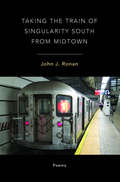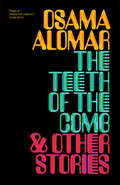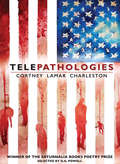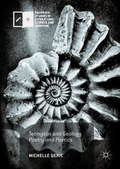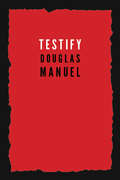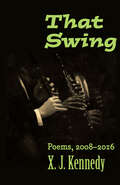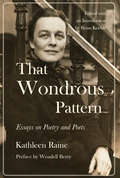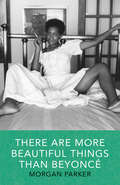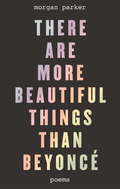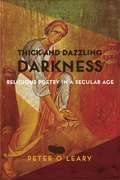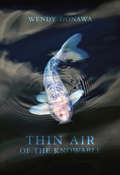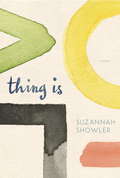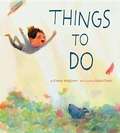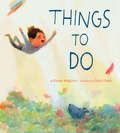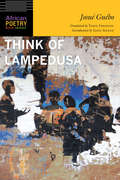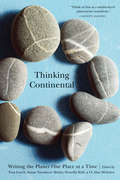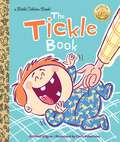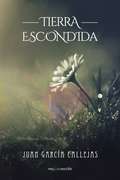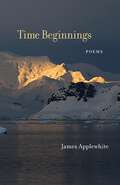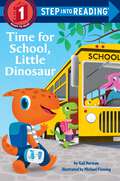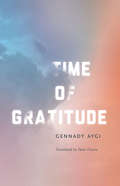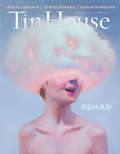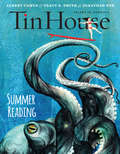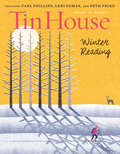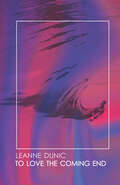- Table View
- List View
Taking the Train of Singularity South from Midtown
by John J. RonanThe general theme of this book, and a number of its individual poems, is that love and language create community. There is little self- reference and confession. Set in Gloucester, New York, or Paris, in Panama or Newtown, the poems come from a commitment to civic poetry, a poetry of social place and witness. Civic poetry is poems written for the public on community topics; poetry accessible to an attentive, general audience. And since it is often meant to be read in public, civic poetry relies on sound and familiar forms: rhyming tricks, assonance, consonance, regular rhythms, refrain and stanza, couplets, etc. And of course, civic poetry, like all poetry, is insightful, well-crafted and fresh, never talks down, and is never watered down.Besides accessibility, sound, rhythm, and freshness, there is another necessary ingredient in civic poetry: hope. Not innocent or immature hope, nothing naive. It may be a battered hope, even diminished, but is not cowed or faint, remains brassy, unabashed. Civic poetry makes no apologies for believing in our stressed and distorted, but wonderful national experiment.
The Teeth of the Comb & Other Stories
by Osama Alomar C. J. CollinsWonderful short stories that sharpen awareness, from a brilliantly gifted Syrian refugee Personified animals (snakes, wolves, sheep), natural things (a swamp, a lake, a rainbow, trees), mankind’s creations (trucks, swords, zeroes) are all characters in The Teeth of the Comb. They aspire, they plot, they hope, they destroy, they fail, they love. These wonderful small stories animate new realities and make us see our reality anew. Reading Alomar’s sly moral fables and sharp political allegories, the reader always sits up a little straighter, and a little wiser. Here is the title story: Some of the teeth of the comb were envious of the class differences that exist between humans. They strived desperately to increase their height, and, when they succeeded, began to look with disdain on their colleagues below. After a little while the comb’s owner felt a desire to comb his hair. But when he found the comb in this state he threw it in the garbage.
Telepathologies
by Cortney Lamar CharlestonCortney Lamar Charleston’s debut collection looks unflinchingly at the state of race in 21st Century America. Today, as much as ever before, the black body is the battleground on which war is being waged in our inner cities, and Charleston bares witness with fear, anger, and glimpses of hope. He watches the injustice on T.V., experiences it firsthand at simple traffic stops, and even gives voice to those like Eric Garner and Sandra Bland who no longer can. Telepathologies is a shout in the darkness, a plea for sanity in an age of insantiy, and an urgent call to action.
Tennyson and Geology: Poetry and Poetics (Palgrave Studies in Literature, Science and Medicine)
by Michelle GericThis book offers new interpretations of Tennyson's major poems along-side contemporary geology, and specifically Charles Lyell's Principles of Geology (1830-3). Employing various approaches - from close readings of both the poetic and geological texts, historical contextualisation and the application of Bakhtin's concept of dialogism - the book demonstrates not only the significance of geology for Tennyson's poetry, but the vital import of Tennyson's poetics in explicating the implications of geology for the nineteenth century and beyond. Gender ideologies in The Princess (1847) are read via High Miller's geology, while the writings of Lyell and other contemporary geologist, comparative anatomists and language theorists are examined along-side In Memoriam (1851) and Maud (1855). The book argues that Tennyson's experimentation with Lyell's geology produced a remarkable 'uniformitarian' poetics that is best understood via Bakhtinian theory; a poetics that reveals the seminal role methodologies in geology played in the development of divisions between science and culture, and that also, quite profoundly, anticipates the crisis in language later associated with the linguistic turn of the twentieth century.
Testify
by Douglas ManuelThis award-winning debut book of poetry examines race, masculinity, religion, class, and the African American experience in the American Midwest.A book of elegiac ambivalence, Testify&’s speaker often finds himself trapped between received binaries: black and white, ghetto and suburban, atheism and Catholicism. In many ways, this work is a Bildungsroman detailing the maturation of a black man raised in the crack-laden 1980s, with hip-hop, jazz, and blues as its soundtrack. Rendered with keen attention to the economic decline of the Midwest due to the departure of the automotive industry, this book portrays the speaker wrestling with his city&’s demise, family relationships, interracial love, and notions of black masculinity. Never letting anyone, including the speaker, off the hook, Testify refuses sentimentality and didacticism and dwells in a space of uncertainty, where meaning and identity are messy, complicated, and multivalent.&“Manuel charts the raw emotional complexities and the impossible daily reckonings that confront a young black man coming of age today in America. . . . Each powerful testimony in this collection stands as evidence of an eloquent and dramatic new voice in American poetry.&” ―David St. John, author of The Auroras and Study for the World&’s Body &“These potent poems testify to those ambivalent moments that might rend or right us, as when an interracial couple drive past a truck with a Confederate flag painted on its back windshield and from which a little boy turns to smile and wave: his &‘blond hair // split down the middle like a Bible / left open to the Book of Psalms.&’&” ―Anna Journey, author of The Atheist Wore Goat Silk
That Swing: Poems, 2008–2016 (Johns Hopkins: Poetry and Fiction)
by X. J. KennedyThe latest rollicking verse from award-winning poet X. J. Kennedy.In this, his ninth book of poetry, lyric master X. J. Kennedy regales his readers with engaging rhythm fittingly signaled by the book’s title, which echoes Duke Ellington’s jazz classic "It Don’t Mean a Thing (If It Ain’t Got That Swing)." Kennedy’s poems, infused with verve and surprise, are by turns irresistibly funny and sharply insightful about life in America.Some poems are personal recollections of childhood and growing up, as in "My Mother Consigns to the Flames My Trove of Comic Books." "Thomas Hardy’s Obsequies" tells the bizarre true account of the literary giant’s burial. Other poems portray memorable characters, from Jane Austen ("Jane Austen Drives to Alton in Her Donkey Trap") to a giant land tortoise ("Lonesome George") to a slow-witted man hired to cook for a nudist colony ("Pudge Wescott"). Kennedy is a storyteller of the first order, relating tales of travel to far-reaching places, from the Galápagos Islands and Tiananmen Square to the hectic back streets of Bamako, Mali. This wise and clever book is rounded out with adept translations of work by Charles Baudelaire, Stéphane Mallarmé, Arthur Rimbaud, and others.
That Wondrous Pattern: Essays on Poetry and Poets
by Kathleen Raine“There is no exaggeration in pointing out that these essays are addressed to the soul of the reader. They are not academic exercises in erudition as a contribution to ‘Eng. Lit.’” —from the introduction by Brian Keeble Kathleen Raine was one of the greatest British poets of the last century. Born to a deeply literary and spiritual household, she went on to study at Cambridge, where she met Jacob Bronowski, William Empson, and Malcolm Lowry. A dedicated neoPlatonist, she studied and presented the works of Thomas Taylor and wrote seminal books on William Blake. With Keith Critchlow, Brian Keeble, and Philip Sherrard, she founded, in 1981, the Temenos Academy of Integral Studies, its journal Temenos, and, later, the Temenos Academy Review. HRH The Prince of Wales became the patron of the academy in 1997.For our new selection, That Wondrous Pattern, Raine offers sixteen essays that range from “The Inner Journey of the Poet” and “What Is Man?” to essays on Blake, Wordsworth, Hopkins, Yeats, Eliot, and several others. The centerpiece, “What Is the Use of Poetry?”, is a rigorous defense of the great art. Editor Brian Keeble himself contributes a fascinating introduction to Raine’s work, and Wendell Berry, a colleague and friend of hers, offers a preface.All who spend time in the presence of this wonderful writer will leave newly entranced with the art and use of the beautiful, convinced that “it is only in moments when we transcend ourselves that we can know anything of value.
There Are More Beautiful Things Than Beyoncé
by Morgan ParkerThere Are More Beautiful Things Than Beyoncé uses political and pop-cultural references as a framework to explore 21st century black American womanhood and its complexities: performance, depression, isolation, exoticism, racism, femininity, and politics. <p> <p> The only thing more beautiful than Beyoncé is God, and God is a black woman sipping rosé and drawing a lavender bath, texting her mom, belly-laughing in the therapist’s office, feeling unloved, being on display, daring to survive. Morgan Parker stands at the intersections of vulnerability and performance, of desire and disgust, of tragedy and excellence. Unrelentingly feminist, tender, ruthless, and sequined, these poems are an altar to the complexities of black American womanhood in an age of non-indictments and deja vu, and a time of wars over bodies and power. These poems celebrate and mourn. They are a chorus chanting: You’re gonna give us the love we need.
There Are More Beautiful Things Than Beyoncé
by Morgan ParkerOne of Oprah Magazine's Ten Best Books of 2017A TIME Magazine Best Paperback of 2017Publishers Weekly's Ten Best Poetry Collections of SpringA Most Anticipated book at Buzzfeed, NYLON and BustleOne of i-D's emerging female authors to read in 2017 'Outstanding collection of poems. So much soul. So much intelligence in how Parker folds in cultural references and the experiences of black womanhood. Every poem will get its hooks into you. And of course, the poems about Beyoncé are the greatest because Beyoncé is our queen.' Roxane Gay 'I can and have read Morgan Parker's poems over and over . . . She writes history and pleasure and kitsch and abstraction, then vanishes like a god in about 13 inches.' Eileen Myles'Morgan Parker has a mind like wildfire and these pages are lit. I can't recall being this enthralled, entertained, and made alert by a book in a very long time.' Jami AttenbergThe only thing more beautiful than Beyoncé is God, and God is a black woman sipping rosé and drawing a lavender bath, texting her mom, belly-laughing in the therapist's office, feeling unloved, being on display, daring to survive. Morgan Parker stands at the intersections of vulnerability and performance, of desire and disgust, of tragedy and excellence. Unrelentingly feminist, tender, ruthless and sequinned, these poems are an altar to the complexities of black American womanhood in an age of non-indictments and déjà vu, and a time of wars over bodies and power. These poems celebrate and mourn. They are a chorus chanting: You're gonna give us the love we need.
Thick and Dazzling Darkness: Religious Poetry in a Secular Age
by Peter O'LearyHow do poets use language to render the transcendent, often dizzyingly inexpressible nature of the divine? In an age of secularism, does spirituality have a place in modern American poetry? In Thick and Dazzling Darkness, Peter O’Leary reads a diverse set of writers to argue for the existence and importance of religious poetry in twentieth- and twenty-first-century American literature. He traces a poetic genealogy that begins with Whitman and Dickinson and continues in the work of contemporary writers to illuminate an often obscured but still central spiritual impulse that has shaped the production and imagination of American poetry.O’Leary presents close and comprehensive readings of the modernist, late-modernist, and postmodern poets Robinson Jeffers, Frank Samperi, and Robert Duncan, as well as the contemporary poets Joseph Donahue, Geoffrey Hill, Fanny Howe, Nathaniel Mackey, Pam Rehm, and Lissa Wolsak. Examining how these poets drew on a variety of traditions, including Catholicism, Gnosticism, the Kabbalah, and mysticism, the book considers how modern and contemporary poets have articulated the spiritual in their work. O’Leary also argues that an anxiety of misunderstanding exists in the study and writing of poetry between secular and religious impulses and that the religious nature of poets’ works is too often marginalized or misunderstood. Examining the works of a specific poet in each chapter, O’Leary reveals their complexity and offers a defense of the value and meaning of religious poetry against the grain of a secular society.
Thin Air of the Knowable
by Wendy DonawaAn elegiac and incisive debut that blends poems of social justice with poems of ordinary life. In her first collection, Thin Air of the Knowable, the physical landscapes of Wendy Donawa’s life—West Coast, Caribbean, prairies—ground many of her poems and often reflect the inner geography of her preoccupations. A road-trip poem moves from prairie winter, “an icy scatter of gravel / the moving centre of this unpeopled world,” past a cattle liner on its way to the slaughter house, but it also passes beneath the sky’s “blazing scroll of light,” and magpies “flashing black and teal in the sun.” Landscape also functions metaphorically to suggest how historical settings play out in the exigencies of individual lives. Other preoccupations include poems that reflect on poesis itself—the strange poem-making compulsion to capture that which is largely inexpressible (hence “the thin air of the knowable”), and the role of dreams, memory, and intuition in shaping a poem’s knowledge. Donawa is, in many ways, a political poet, yet manages to put flesh and blood into everything she writes. In the end, Perhaps there is only the demonic journey.Small beauties by the roadside, andsuch love as we can muster. (from “Pu Ru Paints Zhong Kui the Demon Queller on a Mule”) Praise for Thin Air of the Knowable: “Wendy Donawa’s poetry rests at the very edge of beauty where a wild delicacy resides.” —Patrick Lane “Like the watchmakers of old, Wendy Donawa puts a spyglass to her eye and fixes her vision to the minute, to all that carries on beneath our imperfect sight—worlds upon worlds brought into the sharpest focus.” —Pamela Porter
Thing Is
by Suzannah ShowlerA startling and hip new collection of poetry from a dual American/Canadian citizen who's already making waves on the literary scene.Suzannah Showler's bracing, intense second collection is equal parts cultural critique and phenomenological investigation. Building on the enlightened skepticism of her much-praised debut, Thing Is puts the hashtag age through some much-needed paces. Witty, cutting, heartbroken and cautiously hopeful, these poems are really about "aboutness," about what it means to be alive right now. They also nimbly advance the longstanding poetic argument for the value of considered attention: "What follows from / what you know is / not the same thing / as knowledge. Even / when you get it right."
Things to Do
by Catia Chien Elaine MagliaroWith playful prose and vivid art, Things to Do brings to life the small moments and secret joys of a child's day. There are wonders everywhere. In the sky and on the ground--blooming in a flower bed, dangling from a silken thread, buzzing through the summer air--waiting ...waiting to be found. In this thoughtful and ingenious collection of poems, Elaine Magliaro, an elementary school teacher for more than three decades and a school librarian for three years, and illustrator Catia Chien provide a luminous glimpse of the ordinary wonders all around us.
Things to Do
by Elaine MagliaroWith playful prose and vivid art, Things to Do brings to life the small moments and secret joys of a child's day. There are wonders everywhere. In the sky and on the ground—blooming in a flower bed, dangling from a silken thread, buzzing through the summer air—waiting ...waiting to be found. In this thoughtful and ingenious collection of poems, Elaine Magliaro, an elementary school teacher for more than three decades and a school librarian for three years, and illustrator Catia Chien provide a luminous glimpse of the ordinary wonders all around us. Plus, this is the fixed format version, which looks almost identical to the print edition.
Think of Lampedusa (African Poetry Book)
by Josué Guébo Todd Fredson John KeeneA collection of serial poems, Think of Lampedusa addresses the 2013 shipwreck that killed 366 Africans attempting to migrate secretly to Lampedusa, an Italian island in the Mediterranean Sea. The crossing from North Africa to this island and other Mediterranean way stations has become the most dangerous migrant route in the world. Interested in what is producing such epic displacement, Josué Guébo’s poems combine elements of history and mythology. Guébo considers the Mediterranean not only as a literal space but also as a space of expectation, anxiety, hope, and anguish for migrants. He meditates on the long history of narratives and bodies trafficked across the Mediterranean Sea. What did it—and what does it—connect and separate? Whose sea is it? Ultimately he is searching for what motivates a person to become part of what he calls a “seasonal suicide epidemic.” This translation of Guébo’s Songe à Lampedusa, winner of the Tchicaya U Tam’si Prize for African Poetry, is a searing work from a major African poet.
Thinking Continental: Writing the Planet One Place at a Time
by Susan Naramore Maher Tom Lynch Drucilla Wall O. Alan WeltzienIn response to the growing scale and complexity of environmental threats, this volume collects articles, essays, personal narratives, and poems by more than forty authors in conversation about “thinking continental”—connecting local and personal landscapes to universal systems and processes—to articulate the concept of a global or planetary citizenship.Reckoning with the larger matrix of biome, region, continent, hemisphere, ocean, and planet has become necessary as environmental challenges require the insights not only of scientists but also of poets, humanists, and social scientists. Thinking Continental braids together abstract approaches with strands of more-personal narrative and poetry, showing how our imaginations can encompass the planetary while also being true to our own concrete life experiences in the here and now.
The Tickle Book (Little Golden Book)
by Heidi KilgrasThis Little Golden Book about tots and tickles makes a perfect gift for all ages!Whether it&’s a tummy tickle from Mom, an armpit tickle from Dad, or a whisker tickle from a pet, gigglers of all ages will be endlessly entertained and eager to spend quality tickle time with this book.
Tierra escondida
by Juan García CallejasUn canto ante el asombro de la vida y una reflexión lírica de los recuerdos de la infancia, la experiencia, los viajes, los lugares, las despedidas. <P><P>Tierra escondida es un conjunto de poemas organizado en etapas distintas, como una especie de recorrido con trazas de diario donde el autor nos desvela, a través de los flecos sueltos de la memoria, y la experiencia, la senda del autoconocimiento y el conocimiento de la realidad que nos vive. <P><P>Este poemario es un canto ante el asombro de la vida, y una reflexión lírica de los recuerdos de la infancia, la experiencia, los viajes, los lugares, las despedidas.
Time Beginnings: Poems
by James ApplewhiteIn his poem “Afterward,” James Applewhite imagines a curious Eve in the Garden of Eden, her eye falling upon a twisting river and an S-shaped snake before she eats from the tree of knowledge, choosing change over stasis. Applewhite’s new collection Time Beginnings casts a keenly observant eye on the ever-varied natural world and meditates on the place of humans within it. In these philosophical poems, the slow creation of new planets in the farthest reaches of the galaxy mirrors the development of single-celled Earth organisms whose “first awareness . . . foretell[s] a consciousness / of self, the life lived knowing of death.”Meditating upon topics as far-ranging as the movement of photons in the heart of the sun and the single drop of blood on the finger of a girl holding a rosebud, James Applewhite’s poems explore deeply the mysteries of the galaxies and the complexities of being human.
Time for School, Little Dinosaur (Step into Reading)
by Gail HermanFrom the most trusted brand of leveled readers, this Step 1 Step into Reading book is perfect for back-to-school and features an adorable dinosaur world that looks a lot like ours.Who&’s ready to go back to school? Little Dinosaur is! This simple Step 1 book will help your eager little dinosaur get ready. Though his friend Spikey teases him, Little Dinosaur is first in line for the school bus on the first day of school. Will Spikey learn to get ready as well as Little Dinosaur does, or will he miss the bus? Perfect for first-day jitters or for any parent wanting a model of good behavior for the occasionally trying getting-ready-for-school hour! Step 1 Readers feature big type and easy words for children who know the alphabet and are eager to begin reading. Rhyme and rhythmic text paired with picture clues help children decode the story.
Time of Gratitude
by Gennady Aygi Peter FranceA collection of extraordinary essays by one of the seminal Russian poets of the twentieth century Gennady Aygi’s longtime translator and friend Peter France has compiled this moving collection of tributes dedicated to some of the writers and artists who sustained him while living in the Moscow “underground.” Written in a quiet intensely expressive poetic style, Aygi’s inventive essays blend autobiography with literary criticism, social commentary, nature writing, and enlightening homage. He addresses such literary masters as Pasternak, Kafka, Mayakovsky, Celan, and Tomas Tranströmer, along with other writers from the Russian avant-garde and his native Chuvashia. Related poems by Aygi are also threaded between the essays. Reminiscent of Mandelstam’s elliptical travel musings and Kafka’s intensely spiritual jottings in his notebooks, Time of Gratitude glows with the love and humanity of a sacred vocation. “These leaves of paper," Aygi says, 'are swept up by the whirlwind of festivity; everything whirls—from Earth to Heaven—and perhaps the Universe too begins to swirl. Everything flows together in the rainbow colors and lights of the infinite world of Poetry.'
Tin House: Rehab (Tin House Magazine)
by Rob Spillman Win MccormackAn award-winning quarterly, Tin House started in 1999, the singular love child of an eclectic literary journal and a beautiful glossy magazine. Kick the habit, rebuild that public image, and get back in fighting shape with Tin House this Spring. We're coming at Rehab from every possible angle with new fiction, nonfiction, and poetry from established authors and New Voices alike.
Tin House: Summer Reading 2017 (Tin House Magazine #0)
by Win McCormack Rob Spillman Holly MacArthurAn award-winning quarterly, Tin House started in 1999, the singular love child of an eclectic literary journal and a beautiful glossy magazine. Drop it in your beach bag with the sunscreen and kadima paddles—our annual summer reading issue will feature a smorgasbord of new writing from established and new voices.
Tin House: Winter Reading 2017 (Tin House Magazine #0)
by Win McCormack Rob Spillman Holly MacArthurTin House 74: Winter Reading offers the best of both New Voices and established favorites in fiction, nonfiction, and poetry. Featuring fiction, nonfiction, and poetry from established writers and new voices, Issue 74 will keep you warm on a cold night.
To Love The Coming End
by Leanne DunicIn To Love the Coming End, a disillusioned author obsessed with natural disasters and 'the curse of 11' reflects on their own personal earthquake: the loss of a loved one. A lyric travelogue that moves between Singapore, Canada, and Japan, this debut from Leanne Dunic captures what it's like to be united while simultaneously separated from the global experience of trauma, history, and loss that colour our everyday lives.
